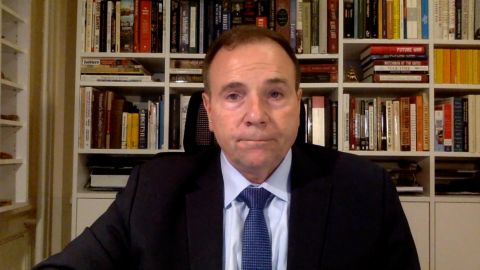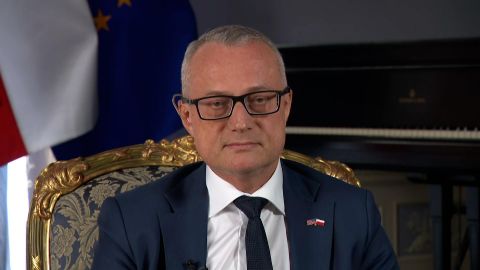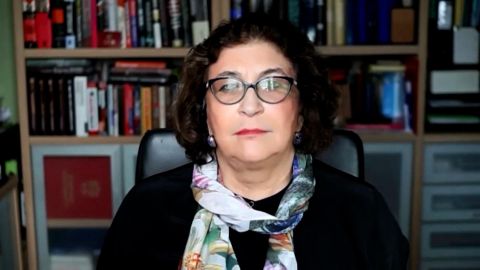Read Transcript EXPAND
CHRISTIANE AMANPOUR: Now, as we’ve talked about the propaganda war and what information people are getting, independent journalism has been all but silenced in Russia under new censorship laws, that do make it a crime to call the war a war or to say that Russia is attacking civilian infrastructure. Yevgenia Albats continues to defy the government’s draconian restrictions. She’s editor-in-chief of “The New Times” magazine and radio host at Echo Moskvy, both are independent media organizations recently shut down by the Kremlin. Despite risking imprisonment, she’s joining Michel Martin from Moscow to discuss the dangers of a misinformation war.
(BEGIN VIDEO CLIP)
MICHEL MARTIN, CONTRIBUTOR: Thanks, Christiane. Yevgenia Albats, thanks so much for talking to us once again.
YEVGENIA ALBATS, EDITOR-IN-CHIEF, THE NEW TIMES: Thank you for having me.
MARTIN: And I’m very sorry about the circumstances, as delighted as I am to speak to you. I mean, you’re the editor and CEO of the “The New Times.” That’s a Russia based independent political site. You are also a talk show host at Echo Moskvy, an independent radio agency, the largest in Russia. And over the past two weeks, both were shut down by the Russian government and accessible to people who have VPN. Do you know why they were shut down? Did anyone say anything to you? Was anything said?
ALBATS: First of all, I have to say that I feel ashamed that I’m a citizen of the country that started the war of choice and of conquest, and that my friends and people whom I don’t know in Ukraine, and hundreds of them are dying right now under the Russian bombs. And I feel very, very sorry that my country is doing that. As for the Russian media and the Echo Moskvy broadcasting and “The Times,” in particular, the problem was that a Russian minister of truth, you know, the special agency which oversee all communications in my country, they pronounce the words war, offense, and invasion with the respective events in Ukraine as forbidden for us to use. And, of course, at Echo Moskvy, we were using the words that we were supposed to use, that’s exactly what’s happening in Ukraine. There is a war. However, now, in this (INAUDIBLE) where everything is opposite, you know, people say words and, in fact, they mean exactly the opposite. It’s not, they say war and they mean peace or they say peace and they mean war. They say truth and that means lies. So, that’s why we got shut down. It’s not just us. 16 different independent publications and websites were closed. More than 160 reporters and advocates immigrated. Basically, nothing but blogs on YouTube. That’s it.
MARTIN: When they shut you down, did they say anything? What happened?
ALBATS: They just sent us a letter then, you know, they send the letters saying that no war happens, and you know, there is no invasion, no war, no assaults, and it’s just the special operation by the Russian troops. And what Russian troops are doing in Ukraine, of course, they’re liberating Ukrainians from nationalists and Nazis. And, of course, you know, they are preventing — you know, it’s a preventative operation because basically, NATO is standing by the Russian borders and about to start an offense on Russia. Listen, you know, it’s all kind of lies.
MARTIN: So, here in the United States, where I am now, we see footage from our correspondents every day. We see that, for example, a maternity hospital was bombed yesterday. We’ve seen civilian cars fired on. So, in Russia, what would people see? People wouldn’t see any of that? They have not seen any of that?
ALBATS: There is a state propaganda machine. These are all networks which cover all Russian 11 time zones. Of course, they don’t show any of that. War doesn’t exist on the Russian propaganda channel. However, there is also internet and those people who have VPN, this is — it is virtual private network, all of us would have it, that would allow us to still read Facebook, to read Twitter, and to get on the websites, and see the footage. There’s also Telegram channels where you can get all kind of footage from Ukraine. Those people who want to know, who are looking for the information, they can get the information from the web. However, a large majority of Russians, you know, they are accustomed to believe in the propaganda machine. I would suspect that about half of those polled, they watch Russian propaganda TV channels. And therefore, they would support the war.
MARTIN: How are people understanding what is happening, the fact that the value of a ruble has fallen so dramatically, the fact that a number of western — you know, highly visible western companies are shutting down their operations, how is this being explained to the public?
ALBATS: Russian currency lost about 30 percent. People’s savings in hot currency, they are frozen on their accounts. They can get only, you know, $10,000 for a period of six months. A lot of companies, you know, yesterday, it was announced that McDonald’s, which was the manifestation of the new Soviet Union of terrorist (ph), and McDonald’s is about to close all their 850 stores, and 62,000 people will be out of jobs. It’s true for — but it’s the same, there is a problem for professionals. For instance, you know, all, you know, five big audit companies, Aniston Young (ph), PricewaterhouseCooper and others, they have also announced that they are going to shut down in the country, and it means only — there are 3,600 people work. So, people will be out of jobs. Starbucks, both — everything, you know. I believe something like about 265 different companies, western companies are walking away from Russia, and that means that thousands and thousands of people will be off the jobs. And it — but also, it suggests that, you know, because of the ruble degradation, poor people are going to be even poorer. You know, we know the conflation and it’s already over 20 percent, inflation has effects on poor. So, people will be suffering. It’s just, you know — we are just two weeks into the war. So, it’s too early for many to feel the burden of this war.
MARTIN: What do you think Putin’s end game is?
ALBATS: Boy, you know, I’m sorry, you know, I cannot read the crystal ball. I think that we are dealing with a sick man, with a sick mind, and I think that he has his own view of the world, and this world, he would like to — you know, he would like to leave a legacy of guy who recreated, at least, in small part the Soviet Union. So, I guess the whole idea is to occupy Ukraine, to conquer Ukraine, to install their puppet government and to make, you know, Ukraine, Belarusian, Russia, you know, these Pan-Slavic state. Whether he will go further north, it’s very hard to say. However, having said that, just keep in mind that according to the sources, Russian government, Kremlin was planning to conquer Kyiv, the Capital of Ukraine, in a matter of three days. We’re already 14 days into the war, and we see that Russian troops are having problems getting supplies, getting, you know, gasoline, getting food. And, you know, there are not enough resources that are — and Putin doesn’t want to announce mobilization. I wouldn’t be surprised if that — if, you know, 10 days from now, Putin announced that Russian army fulfilled its goals and the war is over. And so — and Russia will withdraw. It could go like that. But, you know, once again, I’m not good enough to read the crystal ball. It may go much worse, and I don’t want even to predict the big war in Europe as some analysts say. So, it can go different ways. And we have yet to know now.
MARTIN: You’ve just described a situation that’s become very difficult for Russians. Is there any sense that the frustration that Russians feel will be directed towards the regime and that they will, in some way, seek their own regime change if that’s even possible?
ALBATS: Unfortunately, in this type of regimes and dictatorships, regimes rarely fail because of the popularization (ph). It’s dispute of the elites that may lead to the change of the regime. So, I think that a lot of rich people in this country, people who were — Putin’s constitutes, Putin’s supporters, people who became billionaires and millionaires over the last 20 years of Putin’s rule, these people are extremely upset and extremely frustrated because they lost millions of dollars. (INAUDIBLE) and the Soviet Union where there was some certified ideology, which was called communism or you can call it religion, but it doesn’t matter, there was an ideology, there is no ideology in the contemporary Russia. They are opportunists (ph). They believe in the power of dollars. That’s their biggest belief. And so, now, you know, they are losing their offshore accounts, they are losing their savings. Russian stock market went down the hill and Russian blue chips just became a piece of paper. They got accustomed to live in Russia and make money in Russia, however they got accustomed to spend this money outside Russia. So, for these people, it is a disaster. They are not ready to live in the golden cage as Soviets. Didn’t — so, I’m absolutely aware that these people, sooner or later, will start to push back and in order to return back the kind of life that they got accustomed during the last 30 years of post-Soviet Russia.
MARTIN: Yevgenia, I’m working my way up to asking how are you doing? How are you doing?
ALBATS: I’m doing —
MARTIN: This is not just your career, this is something you’ve dedicated your life to, even to the point — I must say, for people who may have heard our earlier conversation on this program, even to the point of your sending your daughter out of the country so that you could — did not have to worry about her safety while you were pursuing this work. You’ve had opportunities to work in the United States. You’ve chosen to go back to your country in order to serve the public there, and I just cannot imagine what this is like for you right now.
ALBATS: You know, the worse — thank you very much, I really appreciate your concern. I am — you know, I should tell you that it is my choice and I love it here, to be honest with you. I love, you know, writing in Russian. I love Russian language around me. You know, it’s very interesting to observe the development of the regime in Russia. I wrote about that, you know, so many times in my life. And now, I see, you know, where I was right in my predictions and where I was dead wrong. So, it’s very interesting. It’s very — it’s not — you know, I don’t feel, of course, you know, happy. As I said, I feel very, very ashamed. It just boggles my mind that Russian troops are killing our Ukrainians. You know, I travel to Ukraine so many times. My father, Mark Albats, was part (INAUDIBLE) when Nazi occupied Ukraine back during the World War II in September of 1941. You know, he fought along — you know, he was in the same trenches with Ukrainians and they fought the same enemy. And now, all of a sudden, I got to know that my — I’m a taxpayer of this country, and I pay taxes, you know, a lot of taxes in this country, and I understand that now, my taxes are going to the army, which conducts a war of choice. And that makes me absolutely sick. Soviet Union lost 27 million people during the World War II. And I just couldn’t believe that we are doing this, you know. There is all the famous coins, do Russians want the war? And all — the answer was always, no, of course no. We cannot be wanting the war because Russia is just Russian roads, Russian streets, all but dreams. So, this is awful, you know, you feel awful because you are unable to stop this. What can I do? I cannot stop this. You know, and the majority of my fellow colleagues, they immigrated. And so, I’m trying to do stories so not to get jailed because Russian government passed new repressive laws that make anyone who write what they consider fake news, the punishment is 15 years in jail.
MARTIN: Do you think you might get arrested? Do anticipate that you —
ALBATS: I don’t want to be arrested. I don’t want even to guess about this. But, you know, if it’s going to happen, then it will happen. You know, I’m prepared, of course, for that. You know, I have a bag ready. It’s standing by the door. But, you know, I mean, I don’t want to end up in jail. Absolutely not. I’m not suicidal. I am not martyr. And, you know, I just — it just happens. It’s unfortunate development (INAUDIBLE).
AMANPOUR: Yevgenia, can you explain just how close Russia and Ukraine are, or how close Russians and Ukrainians are? Aren’t some of your grandparents Ukrainian?
ALBATS: My grandparents lived in the staple (ph) in Ukraine. My grandparents were Jewish. But three Slavic nations, Russians, Ukrainians and Belarusians, they — the absolute majority — the majority of them are Russian orthodox, they speak the same language. They culturally are very close. They are logistically very close. There is a city, Kharkiv, just 35 kilometers from the border with Russia, it’s down totally — it’s downtown, totally destroyed. However, 95 percent of those who live in Kharkiv, they do speak Russian. So, that’s why it sounds so implausible that Russian troops are fighting in Ukraine. Once again, we are a country which are culturally, religiously and linguistically, extremely close. However, Ukraine — you know, Ukraine has been trying very hard to gain its statehood, to gain its status as a sovereign nation. For centuries, Ukrainians were fighting for that. And now, you know, when they finally became a nation and we can see they fight as the nation, as people who are ready to defend their land, and to defend their statehood, you know, they — my troops, Russian troops came and they’re trying to destroy whatever Ukrainians managed to build over the period of 30 years of their independence that they gained after Soviet Union collapsed.
MARTIN: So, before we let you go, what — is there anything that would make a difference now?
ALBATS: There are quite a few things, but let me tell you that, I am a citizen of the Russian Federation. I cannot wish the defeat my own country. I don’t want my fellow citizens to suffer more than they already do, even though we are responsible for what’s happening in Ukraine. Still, you know, I think that are different minds in your part of the world who know what to do. Yes, there should be much more to be done. And there is, you know, all kind of steps that can be taken in Ukraine, but once again, I don’t want to devise on that, because it means killing of my fellow citizens, those troops in Ukraine. And once again, I should say that I feel ashamed and I am so sorry that Ukrainians are suffering from the deeds of those who do what they do at my expense, at the expense of the taxpayer.
MARTIN: Yevgenia Albats, thank you so much for speaking with us, and thank you for your important work.
ALBATS: Thank you.
About This Episode EXPAND
Poland’s Ambassador in D.C discussed the Russia-Ukraine War. Lt. Gen. Ben Hodges (Ret.) explains the latest military moves in the Russia-Ukraine War. Yevgenia Albats risks imprisonment to join Michel Martin from Moscow and discuss the danger of a misinformation war.
LEARN MORE


